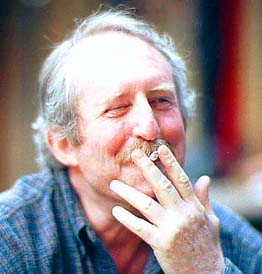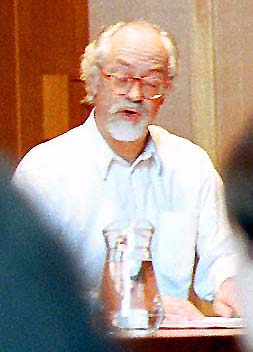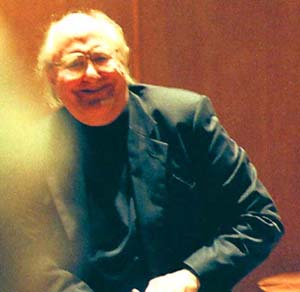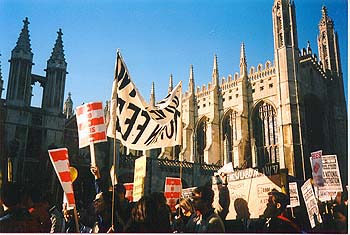
|
J A C K E T # 4 |
|
The URL address of this page is http://jacketmagazine.com/04/cccp.html this material is copyright © Bernardo Soares and Jacket magazine 1998 please read the copyright notice and see the links at the foot of the page back to Jacket # 4 contents page back to Jacket's homepage |
|
|
|
Bernardo Soares
An Excursion to the Cambridge Conference of Contemporary Poetry |
|
|
This piece is 2,600 words or about eight printed pages long. |
|
|
|
How shall I articulate with what I hear? Not indulge an emotional reaction prompted in me nor assert the conceptual 'grasp' which actually is a standing-back and leads to adopting a position, a self-testing-consciousness which demeans its occasion. One way to engage is interlock through metaphor, but this too preens into consistency. I shall resist the bad faith of consistency, or so I mused in closing down my applications, bestowing a good-weekend smile on my secretary, checking travelcard present and leaving an unprecedented twelve minutes before habitual time of departure. Yes, to resist consistency, but refrain too from flattering reality by granting it the variety it claims so flagrantly. I am open! I receive all tendencies! Set aside your received ideas! This is the CCCP embrace; but I who idled six years on the Cam's banks permit myself a weary smile. Nothing over-pronounced. For the heterogeneity itself represents a reassuring consistency - the consistency of CCCP. But the middle-aged are sensitive to change in old haunts, and this year change was discernible. Had the animadversions of Messrs Evans and Moxley in their admirable Dictionary of Received Ideas drawn a little blood? There were signs of organisation - frustrated gestures perhaps; but starting with a little brochure of considered design and for Cambridge improvident with information.  It was therefore with something approaching (but certainly not bearding) confidence that I approached the Chetwynd Room at Kings College, mis-en-scène of the weekend's entertainment, via the only student bar in Cambridge where young women of fashion may be noticed. Later I was to be introduced to one seeming carved from alabaster and in clothes so undisturbable that I was not surprised to learn she was a philosopher. The Chetwynd Room is two rooms, the anteroom this year detaining the confederates at both the bookstall presided over by Mr Peter Riley (who resembles a Victorian genre painting of 'The Antiquary') and more remarkably at an exhibition of Mr Tom Raworth's lifetime achievements in poetry, design, printing, publishing and collage - housed in museum exhibition cases of formidable scale and labelled as eruditely as any collection of Roman oil lamps. This exhibition marked the great and greatly loved poet's sixtieth birthday, and aptly. It was accompanied by a commendable catalogue including an academic essay culled from Mr Simon Perill's doctoral thesis, and an introductory note and cod biography of the poet distinguished by a wit which brings to mind a bullpit terrier executing an immaculate pas ciseaux. Additionally there was a commemorative card featuring poetic works by Messrs Ward and Wilkinson and distorted likenesses of the poet. Enough! Our subject should properly be the ephemeral, the performative. 
Tom Raworth |
|
|
|
|
These conditions were met. The opening reading by Bob Perelman came close to rendering them nugatory. He was the first poet to throw it away, reading seated and in a monotone which failed sadly to convey the work's enlivening incongruities. I found myself wishing that Mr Perelman had affected a tuxedo and a squirting buttonhole to signal to the unresponsive - but barely prompted - audience where 'titter it should'. Mr Perelman's appearance added nothing to the occasion. Having myself donned a tweed Windsor jacket in deference to poetic informality, I was surprised to see this poet in the uniform of 'regular guy'. This was too much - or rather, too little, or as they say in Cambridge, nowhere near enough. Saturday's morning meeting began with Helen Macdonald - up with the lark so to flit back to Wales to inseminate a peregrine. I fear I shall be misunderstood if I call the peregrine fortunate. 'The thought forgets itself with difficulty' as the young songstress trilled. I think Mr Peter Riley would write like this lady but for natural disadvantages (see above).  Helen Macdonald Mr R.F. Langley followed and set out to set the poem up, poem by poem. And revealed them as set-up jobs. Mr Langley inhabits an intellectual universe saturated by the ideas of Melanie Klein. Alas, he has succumbed to the Fisher syndrome whereby the poem insists on telling its reader what it is doing and why, here through a split-off fellow named Jack. The virtues of Mr Langley's scant earlier poems persist but vitiated; he is the most syllabic of poets, setting in motion intricate automatons - clockworks which persuade they are organic at the level of primary process, in little dances of bizarre objects spinning clouds of assonance. But his Jack and his schoolmaster's habit of placing the poem by anecdote prior to reading, reduce the work. Kleinian violence is revealed as another device, local turbulence which threatens not at all. 
R.F. Langley Michelle Granguard completed this set of readings and in French, with Mr Peter Riley providing a sample translation from the single work she presented. État Civil translates as 'Registry of Births, Marriages and Deaths' and titled a set of meditations interesting only insofar as so comprehensively uninteresting - but then, Oulipou formalism does not lend itself to dramatic delivery, and M Granguard was admirable for embodying so aptly the manner and voice of a functionary in rattling through her lines.Satisfied with my dissatisfaction I enjoyed a fidget-cut film for schools on Frank O'Hara (the children would rebel at more than four lines of verse at a time) and determinedly avoided a film on Allen Ginsberg before returning to the tribute reading for the late John Forbes. Here on a Cambridge afternoon on a ship's bridge - the light wood-panelled, concrete-bisected, wedge-shaped theatre - a little sunny, a little rainy, amiable Cambridge poets read Mr Forbes' poems commemoratively and an Australian did too. It was nearly absurd but the untethered location and sometimes clumsy reading made it moving - lugubrious English tones muffling the poems' wit. Only Mr Kevin Nolan of the local team could hit a punchline - but he's not English and knows his way around a stage too. And Gig Ryan stropped her tongue on these lines in preparation for her own later reading. As often in Cambridge no-one had anything much to say, but that shouldn't be mistaken for indifference. Difficulty in using language as a vehicle for feeling doesn't mean there's no feeling. The evening began with Mr Peter Gizzi whose new book Artificial Heart I saw lunged for by several British poets. Gizzi plays no games, 'theoretical' or creative-writing-school. The poems' melancholy arises from a sense that only poetry allows access to life's vividness but only by making life's vividness uninhabitable in its own terms and through its own demands. The loveliness of the line is fraught with loss as its achievement, the poems preoccupied by the difference or lack of difference between the humanly achieved and the 'natural'. This might suggest what used to be called a 'poetic intelligence' implying not-very-intelligent, but actually Mr Gizzi understands the circuits and traps from which Mr Perelman seeks an issue, very well - and his poetic intelligence is in the lyric rise-and-sorrow; no wonder he cites Shelley. Peter Gizzi has yet to find a way to read his poems. I thought they compacted the space about me as nothing earlier had, but others were less impressed by the carcrash delivery. The delivery belied the manner of the poems which carry accounts of perturbation whilst unruffled rhythmically; they drift syntactically but do not so disrupt. Then Mr Roy Fisher - practising the practised lines in dominion over silence. I have heard Roy Fisher read 'The Handsworth Liberties' every seven years, a time suspended like a hospital back-ward, only the poet's marks of ageing to tally - these poems are a1950s three-piece suite neither replaced nor re-covered since the downpayment was made. Fisher still introduces them by glossing Handsworth as a 'shabby suburb' of Birmingham; Handsworth where Soho Road has been the 'front line' of black, inner-city Birmingham for decades now, since The Handsworth Liberties was succeeded by the classic British reggae of Handsworth Revolution. Fisher did not stay to hear what the young poets in Cambridge are up to these days, but he never did. I must credit Peter Armstrong with the finest riposte of the Conference. Fisher blinked towards the darkened door and thought he saw a figure from the past silhouetted there. 'Is that Michael Shayer?' he asked the darkness. And quick as a flash Armstrong (for it was he) shouted back 'No it's an accordion'. (See the collage at the end of the report.) 
Roy Fisher Ms Gig Ryan started by placing a poem as 'ironic' - in Cambridge, where irony is the working hypothesis in any speech transaction. But she was being ironic several times over, she was that wired. I should have known from the black leather and chintz, and the thin leg twitching like a frog's. By this time disco noise was seeping into the cabin, but it was fine by her - she stood forward in of and from the agitation, lines advertising themselves in neon as they switched on. I commend Ms Ryan as a reliable commentator on how Ms Ryan feels on finding herself by mischance in a postmodern capitalist society. She read very well and is truly sharp. 
Gig Ryan I draw a veil over the night as night obliges me by drawing its veil.
Sunday started late, at 2pm. This was not America. Olivier Cadiot Mr Peter Blegvad took the afternoon. Few came, presumably because Blegvad is not published by Equipage or Tender Buttons. I contemplate the possibility that some buy The Independent on Sunday for reasons other than to read Leviathan, Blegvad's comic strip. This is the only reason a grownup would buy it (adolescents do to find out what sexual practice is cool this week). And there may be benighted forty year olds who never listened to Slapp Happy - the songs Blegvad's songs performed haven't sustained that delirium, but he's still good. And his macaronic on milk trumped most every text at the Conference. If certified poets were to work on a single text for twenty years ..... Levi, the baby who is Leviathan in the nursery, knows his Melanie Klein and bites back harder. The last reading started with Mr Keston Sutherland, prince of British Poets in cyberspace. The first thing to hit about Sutherland's verse - to beat you about the head - is a different rhythm. If Lisa Jarnot is Robert Bridges (The Testament of Beauty perhaps?) Keston is Gerald Manley Hopkins, riffing, syncopated. Or more indulgently I'll cite Ed Blackwell. I did love the polyrhythms. What else do I like about this determinedly unlikeable verse? How it's organised through multiple-choice/questionnaire/structured interview/ cognitive routines/ vouchers/personalised letters; like a psychology lab (which means like the modern office) gone ape. He read excellently, flickering through registers, negotiating the jump-cuts. What don't I like? The sexual politics. Brutality towards women is what comes to centre the polyvalent verse; it is where the authorial voice is heard and read to be. If Mr Sutherland thinks pariah-hood is right for a poet - and that's a position with a tradition to it - well enough. And he will be encouraged - encouraging the brilliant young to self-destruct is a sport some nicely-established Cambridge academics savour like a malt or claret. He could be among the best, but maybe outrage is his talisman against the fear that all that cross-ply might become as supportive as a mattress. Before his reading, M Philippe Beck was elected by general but discreet acclaim to the chair previously occupied by Stephen Rodefer and earlier by Eddie Linden. The Chair of Pain-in-the-Arse Studies. How lowering to discover that like Mr Rodefer he is a true master; this is liable to encourage Mr Sutherland. M Beck writes a poetry of ethics unlike anything in English (US UK or Australian), where all transactions are understood as social if from a position of chilly and literary detachment. Relationships such as marriage, guest/host, manager/deputy, friendship/gossip are the preoccupation along with the ethics of fame - which would sound ridiculous in an English poet and unbearably arch in say a New York poet. The poems were introduced and translated by Mr Kevin Nolan who seemed to me to trace the poems' movements with the utmost tact. M Beck is a clumsy bear of a man with a delicate voice; he looks chastened as though sent by his wife to wash up immediately on receiving a high honour. I hope we shall have a bilingual edition with Mr Nolan's versions, but this was the Conference's revelation for this journalist. Of course I knew Lee Ann Brown's writing and indeed her performance. I was interested to know whether I'd like her a second time, once I'd savoured the cookiness and wanted to get my teeth into the pastry. I vouch now for the choux and the confectioner's cream, but she must leave New York shortly. The poems published elegantly for this occasion, The Voluptuary Lion Poems of Spring, just avoid flipness and fey charm; they are loving. A year in an abandoned lighthouse on a salt marsh would guarantee the work ahead. Ms Brown made everybody happy which is an unusual virtue, especially in Cambridge. Post-O'Hara lesbianism is the best new sexual identity to be promoted in ages. I intend a letter to The Independent on Sunday. 
Lee Ann Brown It would be conventional to sum up. Indeed I should provide an Action Plan, but the prospect of action compels a little surge of acid reflux. To these lions and lionesses I leave the requirement to be exceptional and to 'carve out a voice'. In my more modest and bureaucratic spirit I submit these bullet points by way of summary:
. . . Bernardo Soares |
|
 Demonstration
Demonstrationpassing King's. It should be noted by readers prone to fits of excitability and obsessive thoughts of revenge that the opinions of Mr Soares are not necessarily those of the editor of this magazine. - Editor. |
|
Two collages by Tom Raworth follow:
Michael Shayer seen lounging in an old print shop in Havana (return to Roy Fisher)
Collage by Tom Raworth, circa 1989 |
| J A C K E T # 4 Back to Jacket # 4 Contents page Select other issues of the magazine from the | Jacket catalog | Other links: | top | homepage | bookstores | literary links | internet design | Copyright Notice - Please respect the fact that this material is copyright. It is made available here without charge for personal use only. It may not be stored, displayed, published, reproduced, or used for any other purpose | about Jacket | |